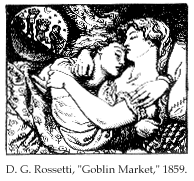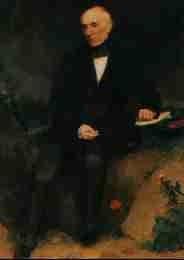ENG 222(69032)
British Literature,
Nineteenth and Twentieth Centuries
Summer I, 1999
Daily, 12:40-2:10
LL 240
Dan
Bivona
|
Dan Bivona's
Summer Office Hours:
M, T, W, Th 2-3, and by appointment
Office: LL 549B
Phone: 5-7748
|
- Course Rationale:
-
- 222 surveys British literature from
the early 19th century through the late 20th century. While
we cannot possibly do an exhaustive job of treating the three
major literary genres (we do some justice to the novel and poetry
but very little to drama), we will be discussing at least some
representative works from each of the major movements and periods.
Because this is a survey course, it makes no pretense to thematic
unity. Rather, some lectures will touch on the broad spectrum
of literary, historical, and intellectual issues out of which
this literature emerged; others will zoom in on the literary
works under discussion for the week.
-
-
- Requirements:
-
- There are two major requirements comprising
80% of your grade: one
5-7 page critical essay (40%), due at the middle of the term, and another 5-7 page critical essay (40%), which
is due on the final day of class. You will have the option to
revise the first paper to improve your grade. In addition, I
will give occasional quizzes on the novels and a grade for class
participation (cumulative 20%). Topics for the critical
papers will be distributed in class (and made available on this
website) 2 weeks before the paper is due. Attendance at
all lectures and active participation in class discussions are
absolutely essential to success in this course. Please
take comprehensive notes on your reading and have all reading
assignments completed by the day on which they are due to be
discussed.
-
- One of the purposes of this online
syllabus is to point you toward websites which provide additional
information about writers, about writing essays, and about literary
theory. I also encourage you to email me with questions about
paper topics. If you have questions about getting started on
a paper, you can help me help you by providing me with a thesis
paragraph and asking me to respond to it. General grading guidelines
for the critical papers can be found here.
-
- N.B. I expect that your papers will
conform to ASU guidelines on academic honesty. That is, I expect
that all work is your own except for that which you have explicitly
cited on your "Works Cited" page. This means you must
cite ideas and words borrowed from online sources as well as
from books and articles found in the library. If you have further
questions about this policy, see the statement issued by the
Women's Studies Program here. It provides a succinct summary of the policy
in effect in this class.
- Sources of Information:
-
- If you are interested in a readable
introduction to basic theoretical issues, start by taking a look
at John
Lye's Literary Theory: An Introduction
and the Glossary
of Literary Theory. For links to sites
that offer help with rhetorical terms or with mythological background,
see Starting
Point for Literary Research. Essays
written for this class should conform to the conventions set
out in the MLA
Format and Citation Guide. You may
find it useful to consult a writing handbook. The following three
are currently available on the Web: Elements
of Style, Online
English Grammar, and Able
Writer: A Rhetoric and Handbook. You
should also make use of a dictionary such as the WWWebster
Dictionary.
-
- You should be familiar with the website
for ASU's Hayden Library. For useful general sources of information
about literary topics consult the following: Literary
Resources Page, Encyclopedia
Britannica (ASU only), and Voice of the Shuttle. For online literary texts try these sites:
Modern
English Collection, The
Online Books Page, and Literature
Online (Chadwyck-Healey; ASU only).
The latter database is also useful for keyword, phrase, and line
searches of British and American poetry, British drama, and some
fiction (the online fiction collection of this database is presently
rather small). You may also find the British
History Timeline a useful source of
historical background information as well as the Encyclopedia
of British History, 1700-1930.
While there is not much online literary criticism currently available,
you may find the IPL
Online Literary Criticism site, Literary
Criticism on the Web, and Project MUSE
useful (the latter has full-text articles from such important
literary journals as New Literary History, ELH, and Modern
Fiction Studies). For a more extensive list of useful online
sources, see the "links" frame on my
home page.
-
-
- Book for the course:
-
- Damrosch et al., The Longman Anthology
of British Literature. Vol. 2. (Longman).
-
-
- This book is now available at the ASU
Bookstore.
|

|
-
- Required readings in the schedule below
come from the Longman Anthology. The links in brackets
will take you to websites that provide further information on
specific topics. For a list of paper topics for the first critical
paper, go here. For a list of paper topics for the second critical
paper, go here.
-
-
-
- Wordsworth and
Coleridge

|
T, 6/1:
Introduction: Romantic Period overview
W, 6/2: Romantics and the Problem
of Origins: Preface to Lyrical Ballads (332-6);"Ode.
Intimations of Immortality from the Recollections of Early Childhood"
(434),"We
Are Seven," (317); "Lines
composed a few miles above Tintern Abbey" (328); "Resolution and Independence" (430-2)
{Romantic
Resources on the Web; John
Locke
Michael
Gamer's List of Romantic Links
William
Wordsworth, Wordsworth
Images
Romantic
Chronology, The
Romantic Period, 1785-1830
Preface
to Lyrical Ballads}
Th, 6/3: Romantics and the Problem
of Origins: Inventing Childhood
(Wordsworth)
F, 6/4:
Romantics and the Problem of Origins: Self as Source
(Coleridge): "The
Rime of the Ancient Mariner" (484-498); "Dejection:
An Ode" (519); Kubla
Khan" (501)
{Coleridge's
Biographia Literaria. Vol. I
David
Hume; Kant's
Prolegomena;
A Coleridge Companion}
M, 6/7:
Wordsworth and Coleridge discussion continued |
T, 6/8: Natural
Supernaturalism and the Familial Ideology:
Mary
Wollstonecraft Shelley
Frankenstein
or, The Modern Prometheus
W, 6/9: Hating What You Make: Frankenstein continued
Th, 6/10: continued
{Resources
for the Study of Frankenstein; Byron's
Manfred; P.B.
Shelley's Prometheus Unbound;
John
Milton,Paradise Lost (ASU only);
A Review of Frankenstein by Sir Walter Scott; The
Victorian Web on "The Sublime"}
F, 6/11: Shelley cont.
{Prometheus
Library}
Aestheticism Versus
the Victorian Notion of Duty
M, 6/14: The
Pleasures of Pain: John
Keats
"Ode
on Melancholy" (778), "Ode
on a Grecian Urn" (775), "Ode
to a Nightingale" (773)
{Edmund
Burke, "A
Philosophical Enquiry into the Origin of Our Ideas of the Sublime
and Beautiful" (excerpts); Aristotle,Poetics}
T, 6/15:
Evangelical
Reform and the Evolution of "Victorian"
Manners
{Landow
on Religion, Landow
and "The Doctrines of Evangelical Protestantism"; Browse
Landow's Victorian Web}
W, 6/16: Tennysonian Melancholy: "Mariana," "The Lady of Shalott"
(1189), "The Lotos-Eaters" (1194), "Ulysses"
(1198), "Locksley Hall" (1204)
|
First Critical Paper Due
Topics |
Th, 6/17: Tennyson cont.
F, 6/18: George Eliot, "Brother
Jacob"
M, 6/21: The Work of Art in the Age
of Mechanical Reproduction: Aestheticism
and the Decadents
Algernon
Charles Swinburne, "Hymn
to Proserpine" (1752), "The
Triumph of Time" (1750), "The
Garden of Proserpine" (1517),
"Ave
Atque Vale" (1519)
{Epicurus;Walter Benjamin, "The
Work of Art in the Age of Mechanical Reproduction";
The
Baudrillard Project; Donna Haraway,
"A
Cyborg Manifesto"; Victor
Margolin, "The
Politics of the Artificial"}
T, 6/22: Walter
Horatio Pater, "The
Child in the House" (1765), "Conclusion"
to The Renaissance (1763)
W, 6/23: Aestheticism
and Decadence continued: Rossetti, "Goblin Market" (1712);
'Michael Field,' "La Gioconda" (1946), "A Pen-Drawing
of Leda" (1946), "A Girl" (1946)
{Plato's
Symposium and Phaedrus;
The
1885 Criminal Law Amendment;
Rictor Norton's Essays on Gay History and Literature; John Addington
Symonds, "A Problem in Greek Ethics"; Michel
Foucault Links}
Th, 6/24: Aestheticism and Decadence
cont.
F, 6/25: Conrad, Heart of Darkness
M, 6/28: Conrad cont.
T, 6/29: Conrad cont.
W, 6/30: Modernism and Culture (Modernity)
William
Butler Yeats, "Easter,
1916" (2310); "The
Second Coming" (2312); "Sailing
to Byzantium" (2315); "Crazy
Jane Talks with the Bishop,"(2326);
"Under
Ben Bulben" (2329)
T.S.
Eliot: "Tradition
and the Individual Talent" (2447)
and "The
Love Song of J. Alfred Prufrock" (2420)
{An
Index of Sites on Modernism}
Th, 7/1: Modernism cont.
F, 7/2: Modernism cont.
|
Second Critical Paper Due
Topics |
Return to Dan
Bivona's Home Page
-
-
-
-
-
-


